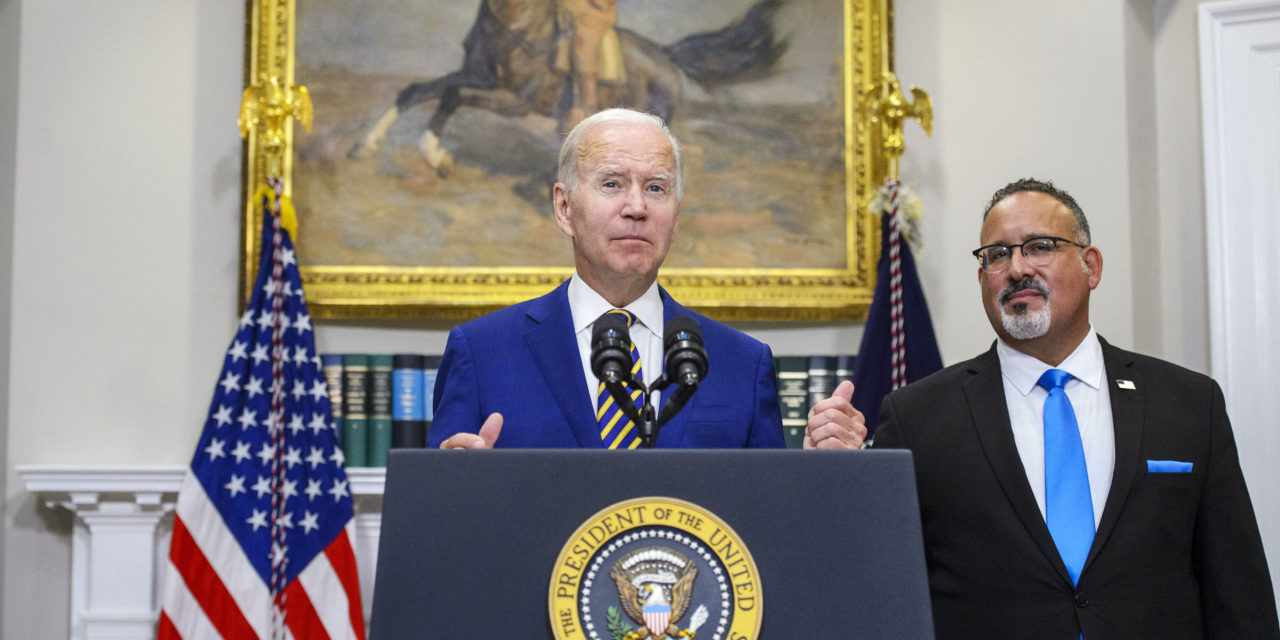President Biden announced on Wednesday that the Federal government will be forgiving $10,000 in student loans for borrowers earning less than $125,000 annually – or for couples making up to $250,000. The plan will also continue the pause on repaying student loan debt through December 31, 2022, for “one final time.”
The administration also announced that the U.S. Department of Education (DOE) would provide up to $20,000 in debt cancellation to Pell Grant recipients.
The White House asserted on Wednesday that under the plan, “No high-income individual or high-income household – in the top 5% of incomes – will benefit from this action,” which is defined as a household bringing in $250,000 annually.
Announcing the student loan cancellation in a speech from the White House, President Biden said that 43 million people will benefit from the debt cancellation.
The plan comes after elected officials on Capitol Hill have been debating for months over whether the executive branch has the authority to unilaterally cancel student loan debt.
Commentators and elected officials, including from the president’s own party, are questioning the constitutionality of the move.
According to the left leaning Brookings Institution, forgiving up to $10,000 in student loan debt per borrower would cost taxpayers around $373 billion.
Speaker of the House Nancy Pelosi has said that the president does not have the authority to unilaterally cancel student loan debt.
“People think that the president of the United States has the power for debt forgiveness. He does not,” Speaker Pelosi said. “That has to be an act of Congress.”
Under the Spending Clause of the U.S. Constitution, found in Article I Section 8, Congress has been delegated with the power to “lay and collect Taxes, Duties, Imposts and Excises, to pay the Debts and provide for the common Defence and general Welfare of the United States.”
The controversy over whether the executive branch can usurp the spending power provided to Congress raises the likelihood that the administration’s student loan cancellation plan will spark a spate of lawsuits and may end up before the U.S. Supreme Court, posing a true Constitutional exercise involving all three branches of government.
According to CBS News White House Correspondent Steven Portnoy, the White House is citing a post-9/11 federal law as the basis for its authority to cancel debt. The law allows for debt cancellation “in connection with a war or other military operation or national emergency.”
Apparently, the White House believes “the present COVID-19 pandemic” provides the national emergency basis for the law to be employed.
Of note, the DOE itself issued a legal memo in 2021 stated that the executive branch does not have the authority to enact widespread student loan forgiveness.
“We believe the Secretary does not have the statutory authority to cancel, compromise, discharge, or forgive, on a blanket or mass basis, principal balances of student loans,” the memo stated.
Wednesday’s announcement instantly sparked reactions from both sides of the political aisle.
South Carolina Senator Tim Scott tweeted his response to the announcement by citing his personal story.
“My mom didn’t go to college. She worked two jobs to keep the lights on & provide for my brother & me,” Scott wrote.
“President Biden wants Frances Scott & millions of other Americans to pick up the student loan bill for the wealthiest among us who carry the majority of the debt. That’s wrong.”
Senate Majority Leader Chuck Schumer tweeted his support for the administration’s decision.
“Today was a great day because President Biden and Vice President Harris took action to #CancelStudentDebt!”
Others were quick to point out that many universities with massive endowments should be on the hook to forgive student’s debt, not the average taxpayer.
Harvard University has a shockingly large $53.2 billion endowment. Yale University’s endowment is $42.9 billion, while Stanford University’s is $37.8 billion, and Princeton University’s is $37.7 billion.
According to the National Center for Education Statistics, the value of all the endowment funds of colleges and universities combined was $691 billion at the end of fiscal year 2020 – roughly double what would be needed to cover the entire cost of the administration’s student loan cancellation plan.
To learn more about our nation’s $1.7 trillion student loan crisis, click here.
Related articles and resources:
Calls for Student Loan Cancellation Grow. I Paid Off My Debt – Where’s My Refund?
Are You Paying Off Student Loans? Here’s Advice from a Ramsey Solutions Personality.
New Documentary ‘Borrowed Future’ Exposes Student Loan Crisis
Photo from Reuters.






